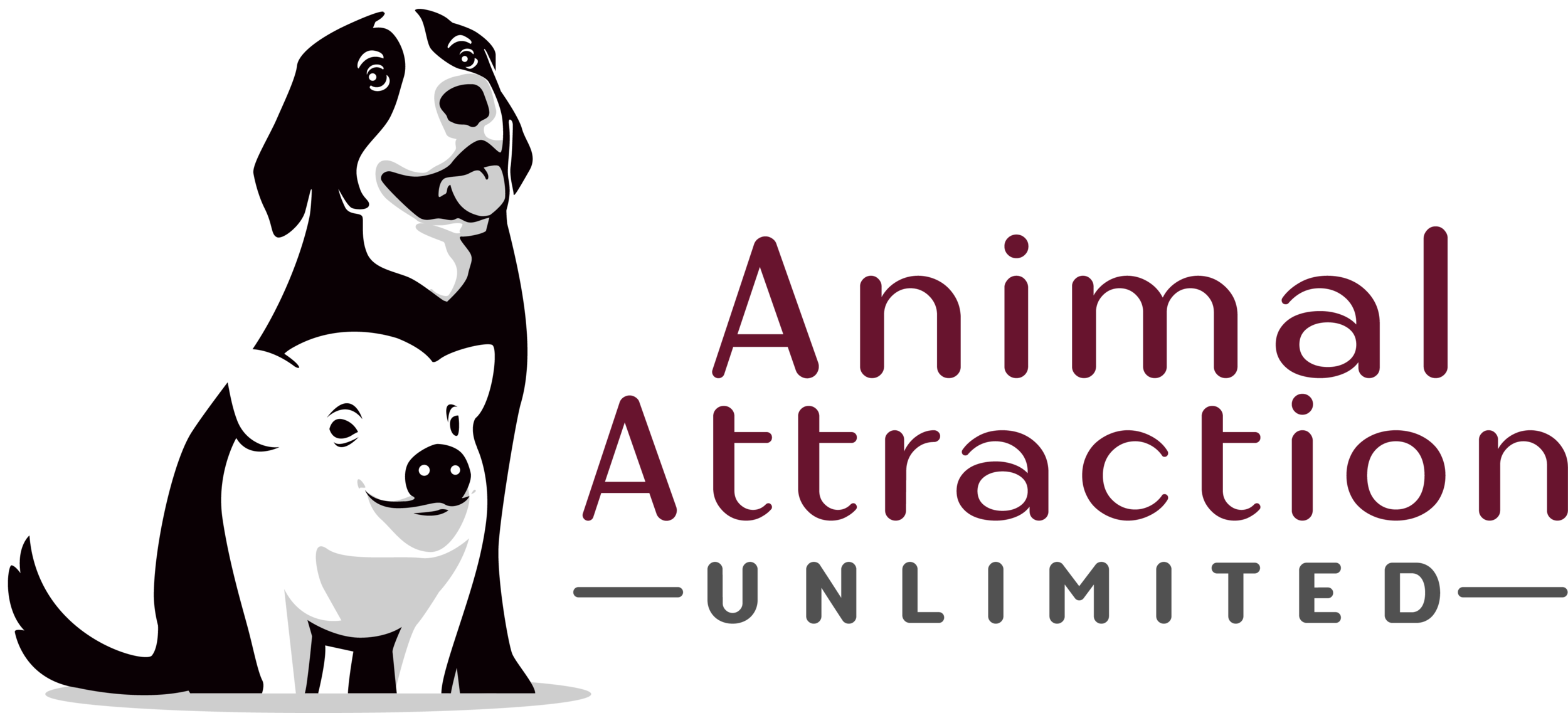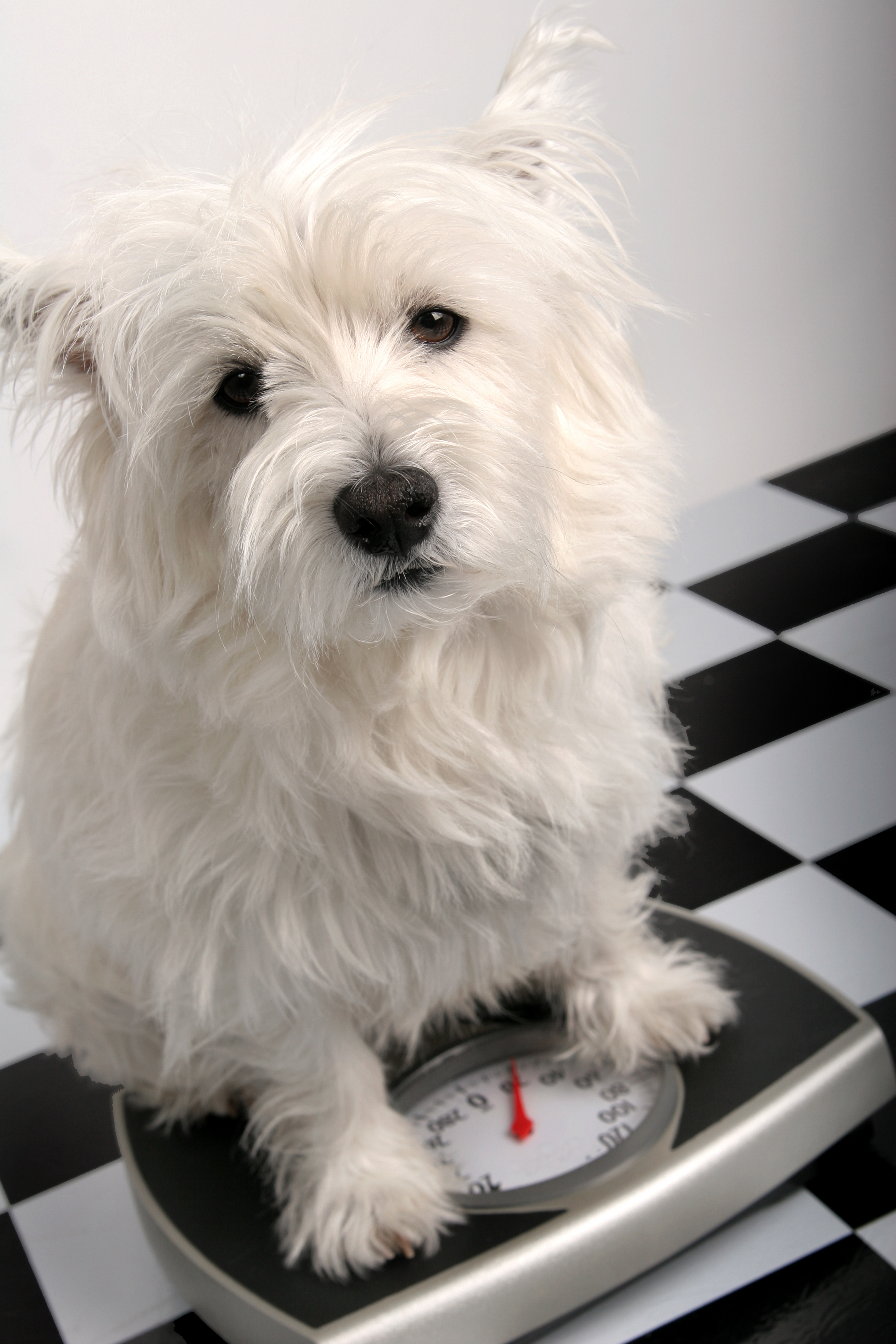Why You Should Be Concerned About Your Dog’s Weight
I saw this article yesterday and just had to write something about it since obese dogs are one of my biggest pet peeves. About 20 years ago when I graduated from school my very first client had a huge German Shepherd. When I say huge, I mean *huge*. He weighed over 120#. When I'd take him out to train him people were impressed with his size & say "wow, how much does he weigh?", as if it were a good thing. My response to them was always "thirty pounds more than he should." He was an impressive looking dog named Magic. Almost completely black, plush coat, large head & chest, great looking and scary as well. What I never understood about the people who asked how much he weighed was couldn't they see he was having trouble walking? Couldn't they see his back end giving out? The dog was only 6 years old and couldn't walk 3 blocks without panting heavily and having difficulty. Yet people were impressed by his size? I just didn't get it.
There was also a person in a group dog training class I've attended. His first dog was a small sized, Golden Retriever that was at least 20# overweight. The training class was upstairs, which the dog had trouble negotiating. That dog died an early death due to complications from being so heavy. Despite all the comments from the class instructor regarding the dog's weight the owner just wouldn't listen. After that dog passed away he got another one. The second is also a smallish Golden Retriever. Within 10 months of owning this dog, she too, was carrying 15+# of extra weight.
It is so sad to see animals like this. It's not only dogs either since I've seen plenty of overweight cats as well. What also confuses me is that when I mention to clients their dog could stand to lose a few pounds they are shocked. Many of them were just at the vet a week before and the doctor didn't say anything about it. The thing is vets think they will lose clients if they tell someone their pet is fat.
But, if the animal stays heavy it will die early and they still lose a client. I don't understand why they don't tell people. Maybe they think the person will take it personally & think the doctor is actually talking about them? If someone has an answer for that please enlighten me. One time I took my first pitbull to the vet. She was a new vet at the clinic we go to and when she first saw him she said, "isn't he a little thin?"
Gee, they'll say when an animal is thin but won't mention when an animal is fat when being thin is much more healthy than fat? Anyway, my response to her was that no, actually, he is a few pounds heavier than I like and I was planning to take some weight off. Especially since he was an agility dog and being overweight can be dangerous when running an agility course. She looked at me as if I was nuts and proceeded with the exam.
When she finished she apologized to me. She said I was right and that he could stand to lose a pound or two. Then she told me that she is just so used to seeing heavy dogs that he was thin in comparison.
So, how do you know when your pet is fat? The general rule of thumb is to feel their ribs. Standing over your dog, place your thumbs together on their spine with your fingers draped down on either side. With very little pressure in your fingers, run your thumbs up & down their spine. You should be able to feel the bumps of the ribs. Now I don't mean their ribs should be sticking out and there isn't any fat or muscle on them at all. What I mean is you should feel the outline. Even if your dog has a heavy coat you will still be able to feel them, so don't blame their coat if you can't. In a dog with little coat, like a Doberman, or Rottweiler, I like to be able to see the very last rib. If you can see the outline of the last rib then you don't need to run your thumbs along their spine. In addition, when looking down at your dog you should see a waist line. There should be an indentation from below the ribs to the hips. And from the side the abdomen should tuck up after the ribcage to in front of the hind legs. If you don't see or feel these things, chances are high that your pet is overweight. This goes for cats also, except for the side view. Most indoor house cats don't have an abdomen that tucks up, but everything else is the same.
What do you feed your pet? Don't just take for granted that what you feed your pet every day is what he should get every day. And no matter what, don't ever go by the feeding chart on the back of the dog food package. Use that as a general guideline to start with, but then feel your dog each week to see where he is. Dog food manufacturers don't care if your dog is fat. They also don't care if you throw food away. Either way, they make more money so they tend to put higher amounts on the label.
So, let's say you usually feed 2 cups of food a day. Don't just go along merrily feeding him 2 cups a day for the rest of his life. Feel your dog. Every week I feel my dogs to see if they are getting enough food or not and adjust it appropriately. During the Summer they don't burn as many calories as they do in Winter when they need to stay warm. When it's hot outside they don't run around as much on their own, they don't like the heat any more than we do. Generally my dogs need less food in hot weather, then, when it gets cold I up it a bit. I'll also add more fat to their diet when it gets colder. If you train your dog with food during the day, or give your dog treats you need to take that into consideration before feeding them. If you only feed once a day in the morning but you know you will be training with food later then don't give him the full amount. If you feed twice a day or just in the evening, subtract an amount equal to the treats they got during the day. It's really not that difficult to do.
"But he's looking at me like he's hungry" or "I feel guilty when I'm eating and he looks at me *that way*". My answer to this is, so what? Guess what people, dogs know how to act. They are much more adept at training us and manipulating their environment than we are. They easily learn that adopting a particular facial expression or posture can get us to do a certain thing. If they put a particular look on their face which has worked before to get them food they will do it again. Dogs are scavengers. Most dogs eat whenever there is food available. They'll eat even if they aren't hungry just because it's there (well, okay, that applies to me as well).
I know that many dogs that are used to getting a large amount of food start to steal things when you cut back. I think this happens because they are used to having that full feeling and when you feed them less food they think they need more. When I began taking weight off Magic he did this. He started getting into things looking to fulfill a need. The way I handled it was to feed him vegetables. The vegetables were mainly the frozen mixed kind that I just defrosted & put in his food. They filled up his stomach to give him that feeling, but didn't add many calories. I'd also add shredded carrots to his food, those really took up a lot of space in his stomach. Shredding carrots seems like a lot of work, but it wasn't. I just took a little food bucket to the nearest Jamba Juice, or smoothie place, and asked them to place it under the shoot of their carrot juicer. I'd return an hour or two later & have enough carrot shavings to last a week. They throw that pulp out anyway so they were happy to give it to me.
When you have a pet their health is your responsibility. Health doesn't stop at feeding them and giving them water. They need exercise, they need to not eat junk food, which many of the dog foods and treats are, and sometimes they need to be deprived of things they think they should have. That is all part of being a great pet parent. As the other article states, there are many forms of animal abuse and cruelty. Making your pet obese is both cruel and abusive. Please, feed your pet wisely.

